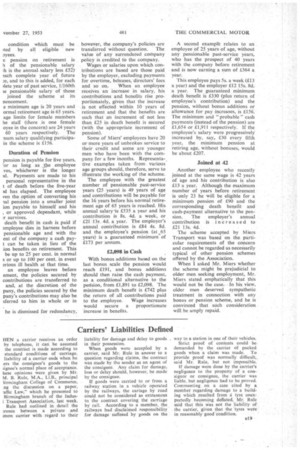Carriers Liabilities Defined
Page 53

If you've noticed an error in this article please click here to report it so we can fix it.
HEN a carrier receives an order by telephone, it can be assumed the contract is made according to standard conditions of 'carriage. liability of a carrier ends when he .ers the consignor's goods to the ignee's normal place of acceptance. hese opinions were given by Mr. M. 13. Rule, M.A., LLB., principal 3irmingham College of Commerce, ng the discussion on a paper, .affic Law," which he presented to Birmingham branch of the IndusTransport Association, last week. Rule had outlined in detail the ;rence between a private and mon carrier with regard to their
liability for damage and delay to goods . in their possession.
When goods were accepted by a carrier, said Mr. Rule in answer to a question regarding claims, the contract was made by the sender as an agent of the consignee. Any claim for damage, loss or delay should, however, be made by the consignee.
If goods were carried to or from a railway station in a vehicle operated by the railways, the cartage by road could not be considered as extraneous to the contract covering the carriage by rail. According to a member, the railways had disclaimed responsibility for damage suffered by goods on the way to a station in one of their vehicles.
Strict proof of contents could be demanded by the carrier of packed goods when a claim was made. To provide proof was normally difficult, said Mr. Rule, but not impossible.
If damage were done by the carrier's negligence to the property of a consignor or consignee, the carrier was liable, but negligence had to be proved. Commenting on a case cited by a member regarding damage to a building which resulted from al tyre unexpectedly becoming deflated, Mr. Rule said that this was not the liability of the carrier, given that the tyres were in reasonably good condition.




























































































